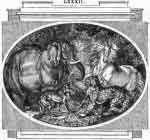A Wolf and Leopard gave Horse their prey to hold. A Fox talked the Horse out of it. An Elephant decided that all three had to claim the prize. Not likely.
In doubtful and intricate cases, discrimination and solidity of judgment are required.

Northcote
A Wolf and a Leopard joined company on a hunting party, and mutually agreed that, at the end of their rapacious chase, they would divide the spoil equally between them. They soon made prize of a Lamb, which they agreed to deliver into the possession of the Horse, who it happened was under covert hard by. At this moment they were joined by the Fox, who thinking there was something to be got, accompanied them in his familiar way, as if he had been one of the hunting party; and officiously assisted in delivering the Lamb to the Horse, who was desired to keep it for them until they should return from the chase, and demand it of him again.
Soon after the cunning Fox, slyly quitting his companions, returned alone to the Horse, telling him that his companions were so much fatigued by their unsuccessful chase, that they had sent him for the Lamb, which they intended to make their repast upon, in order to refresh themselves the better to pursue their prey. The honest Horse made no scruple of delivering up to the Fox the Lamb which bad been given into his charge: when crafty Reynard with great alacrity carried it off on his back, for his own sole use, and of course like a true rogue, returned no more to his former companions.
At the termination of their day’s sport, came the Leopard and the Wolf, having had but little luck in their chase, and demanded from the innocent Horse the property which they had left in his charge. It was in vain that the Horse told them his tale, and that he had honestly and honourably delivered the property to their companion, who together with them had left it in his charge,—this tale they would not listen to, but said the Fox was a thief and a traitor, and had no right whatever to their goods—that if the Horse was such a fool as to be deluded by his false tale, that was not their business, but his—that they would have justice, and have their own property which they had left with him. The poor affrighted Horse who knew not what to say for himself in so intricate a case, agreed to go with them to have the cause tried before, and adjudged by, the sagacious Elephant.
When they came into court before the judge, each party told his tale—when the poor Horse trembled with fear; for even himself could scarcely see a reason why judgment by law should not be given against him.
The wise Elephant gravely heard their several accounts, and thus replied:—”I find that each of you have told me the truth, because your statements perfectly agree as to facts, and thus I decide your different rights, and pronounce judgment in the cause. You three, Leopard, Wolf, and Fox, in company, deposited in keeping of the Horse the said property, the Lamb, as your prey—and which the Horse has honestly confessed to be a true statement of the case—you therefore cannot object to my determination: thus, “That as you three in company delivered to his keeping your joint property, of course whenever you three personally return again, and demand it, he must deliver it up at his peril.”
This wise judgment cleared the Horse entirely, as there was but little danger that the roguish Fox would ever be found again in that company.
Application
In the determination of doubtful and intricate cases, the nicest discrimination and solidity of judgment are required. This example demonstrates how brittle are the bonds that connect the society of rogues and plunderers, and how precarious the dependance they can place on each other. It also affords a lesson of instruction, cautiously to avoid the slightest intercourse with persons of bad or suspicious character, by which those of the most upright intentions may sometimes be involved in the greatest difficulty and danger. J. N.
